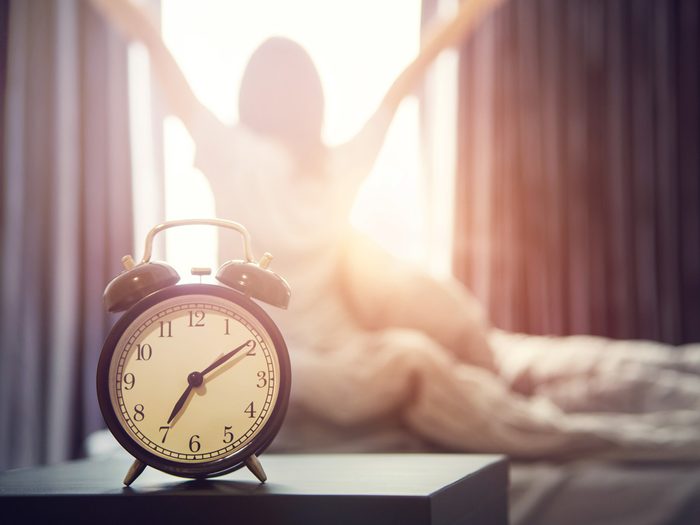
Stop your snoozing
We all love the snooze button, but it doesn’t love us back. Marlie Cohen, certified personal trainer, holistic health coach and blogger behind Kale and Krunches, says that getting up at the same time every day—without hitting snooze—is key to waking up refreshed. When you silence your alarm to catch a few more Z’s, “you’re just closing your eyes and drifting off, then startling yourself as you wake up again,” says Cohen. So your body doesn’t actually benefit from those extra winks of sleep. To force herself to wake up at the first sound of the alarm, Cohen keeps it far enough away from bed that she has to get up to turn it off.
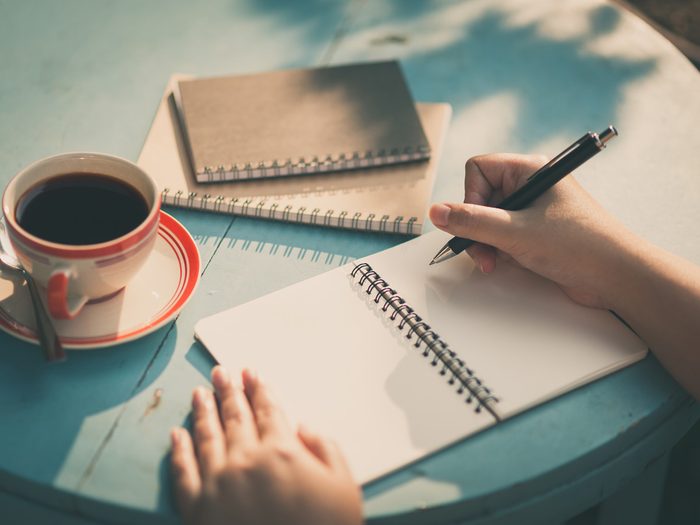
Slow down your morning
Now that you’ve gained those extra minutes you would have otherwise spent snoozing, you can take some time to ease into your morning. Cohen starts her day by sipping a coffee while she sets one positive affirmation, thinks about three things she’s grateful for that day, and writes them in a journal. Mornings are often one of the busiest, most stressful times of the day, but Cohen credits her simple soothing routine with putting her in a state of calm that helps her prevent burnout later on. “I find when I’m not spiking cortisol levels in the morning, that leaves me with more energy throughout the whole day,” she says.
(Here are more ways to become a morning person.)

Take small sips of coffee throughout the day
Did you down a triple shot of espresso this morning just to get yourself moving? You may be actually driving yourself deeper into a low-energy rut. One of the healthy ways to boost energy would be to monitor (not give up) your caffeine intake. Research from Harvard Medical School finds that frequent low doses of caffeine—the amount in 1/4 cup (50 mL) of coffee—taken throughout the day were more effective at keeping people alert than fewer larger doses.
(Like milk in your coffee? Here’s the healthiest milk to add to your cup.)

Balance your breakfast
Eating a mix of complex carbs, healthy fats and protein ensures your energy is slow-released throughout the day, and there’s no better time to pay attention to this nutritional balance than first thing in the morning. That’s when you set the tone for the whole day. While a breakfast of simple carbs would set you up for a crash so you’re craving sugar a couple of hours later, a more balanced approach will keep you going till lunchtime. Cohen incorporates fat and protein into her a.m. spinach smoothie by adding chia seeds and peanut butter. On other days, she eats eggs alongside avocado and whole-grain toast.
(Try this energizing buckwheat granola recipe.)

Lighten your glycemic load
Foods with a low glycemic load (like beans, bran cereal, barley, nuts, and yogurt) have less impact on your blood sugar than high-glycemic foods (like white rice, spaghetti, potatoes, cornflakes, baked goods, and sugary juices and drinks). Eating more low-glycemic foods will help keep your blood sugar steady and avoid the lightheadedness and “shakes” that happen when blood sugar falls.

Slip in some strides
Sneak in a brisk, 10-minute walk is one of the healthy ways to boost energy when you’re feeling sluggish. Often, people with fatigue have a decreased supply of adenosine diphosphate (ADP), an intracellular “messenger” involved in energy metabolism. Translation: There’s not enough “spark” in the engine. Jump-start it with a brief jaunt.

Hydrate
Fatigue is often one of the first symptoms of dehydration, and if the only thing you’ve sipped all day is coffee and soft drinks, you’re likely dehydrated. Keep a jug of water on hand to sip throughout the day.
(Find out if you’re actually hydrating correctly.)

Try a peppermint perk
When you need a quick and easy wake-up, Joy McCarthy, holistic nutritionist and author of Joyous Detox and Joyous Health recommends dabbing a bit of diluted peppermint essential oil on your wrist to inhale its energizing properties. If you’re not a fan of peppermint, try a citrus oil like grapefruit or orange. Just beware when heading outdoors—citrus oils are phototoxic, which means they can make skin burn more easily when exposed to the sun.

Supplement correctly
No matter how nutritious your diet may be, your body may be depleted in certain nutrients—which could be the reason you’re tired even after a good night’s rest. Being deficient in vitamin B12, for example, can cause feelings of fatigue. Talk to your doctor to learn if you’re deficient in any key nutrients and find out which supplements you should take.
(Are you taking supplements the right way?)

Try Siberian ginseng
This herbal remedy stimulates your nervous system and helps to protect your body from the ravages of stress. Look for a supplement containing at least four percent ginsenosides, and take two 100 milligram capsules daily. Caveat: Don’t take ginseng if you have high blood pressure.

Revamp your relaxation
If Netflix is your go-to way to unwind on evenings and weekends, it might be time to mix it up. Though it seems like lying motionless on the couch would be a good way to recharge, you’re likely to notice you feel more tired when you peel yourself off the couch. McCarthy suggests taking a weekend break from the TV. “Instead of binge-watching your favourite show, go out for a walk,” she says. “Just breathing in the smells of the trees along a trail can have a physiologic effect on your body.” Research has shown that spending time in nature is associated with lower blood pressure and improved mental health. “And outdoor exercise has also been shown to boost serotonin, a feel-good neurotransmitter,” adds McCarthy.
(Check out the health benefits of awe walking.)

Turn in 15 minutes early
Every week, continue to go to bed an additional 15 minutes earlier until you find the right amount of sleep for your body. This is one of the most effective ways to boost energy. You’ll know you’ve had enough sleep when you wake up feeling refreshed.
(Tend to wake up in the middle of the night? Here’s how to sleep right through.)

Get analyzed
Are you waking up tired? Dr. Charles Samuels, medical director at the Centre for Sleep and Human Performance says that approximately 30 percent of North Americans do not get enough sleep and many complain of poor quality sleep. For some, it’s simply a matter of clocking more hours in bed. Or, if you’re sensitive to disturbances like noise or light, investing in earplugs or room-darkening blinds could do the trick. But sometimes, if you’re getting enough sleep but it just isn’t restorative, it’s time to see a sleep doctor for a sleep analysis. If you snore and wake up tired, you could have sleep apnea — especially if you’re overweight. A sleep analysis can help you and a doctor figure out what’s going on when you’re in bed, and how to make that time rejuvenating.
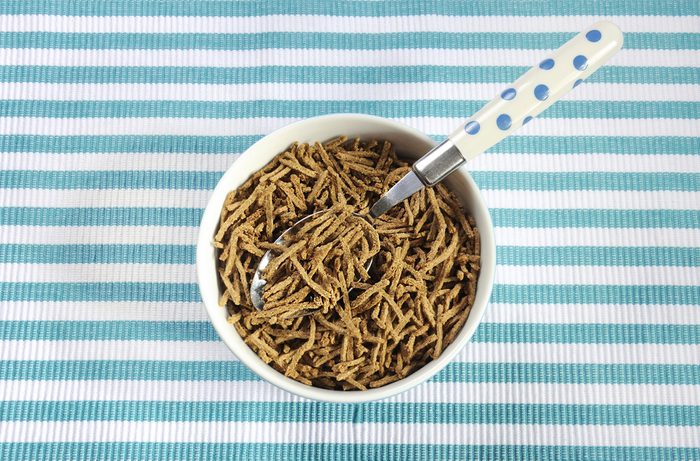
Have a bowl of 100 percent bran cereal for breakfast
Bran is high in phosphorous, a mineral the body needs to metabolize carbohydrates, fat, and protein so they can be used as energy.
(Here’s the healthiest cereal in Canada.)

Walk gratefully
As you stride, focus on what you feel most thankful for. “This simple technique combines the power of gratefulness with the positive effects of walking and exercise, flooding your brain with happy neurotransmitters and endorphins,” says Jon Gordon, energy coach and author of Become an Energy Addict. “It’s a simple yet powerful exercise that energizes the mind and body.”
(Also, learn how a mental health gym can transform your emotional well-being.)
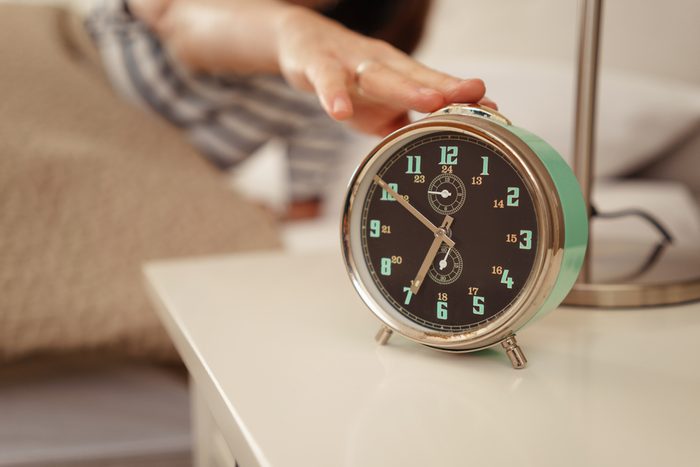
Put yourself on a sleep schedule
Wake up at the same time every day, even on weekends, no matter how little sleep you get the night before. By forcing your body to adhere to the pattern, you’ll fall asleep faster when your head hits the pillow. Give it a few weeks to work.
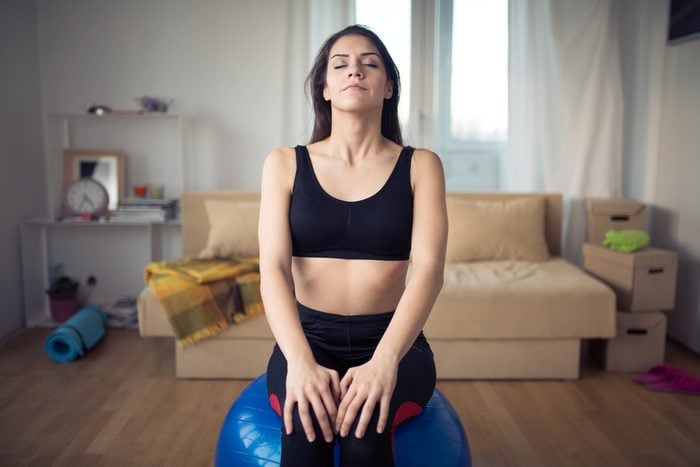
Breathe in energy
Place your hands on your knees or over your stomach, and breathe into your belly so that your hands rise and fall with your breath. Imagine you’re inhaling a white light that fills your body with vital energy. Do this for five full breaths. Then, as you inhale, tighten the muscles that connect your shoulders and neck, pulling your shoulders up toward your ears. “When your shoulders are snug around your ears, hold your breath for just a second,” says Karl D. La Rowe, a licensed clinical social worker. “Then exhale as you release the tension and your breath in one big whoosh-as though you’re releasing the weight of the world from your shoulders. Repeat until you feel refreshed.”
(These breathing exercises can help reduce anxiety.)

Get inclined
You are going to love that we included this on our healthy ways to boost energy list. Lie on your back and use pillows to prop up your feet so they’re higher than your head or, better yet, lie on an adjustable exercise bench or other surface that slants. In India, yogis do this to encourage blood flow to the brain, which is thought to fight fatigue and boost alertness.
(Also, here’s a morning yoga routine that promises to boost your energy.)

Replace your pillow
More restful, reinvigorating sleep may be within your reach—if you upgrade your pillow. Wake up in the morning with a sore neck? Opt for a soft, thinner pillow or a special neck pillow. In one Swedish study, a neck pillow enhanced sleep. These pillows come in different shapes: Some are rolls, others are rectangular with a depression in the middle.
Next: 16 Healthy, Energy-Boosting Breakfast Recipes to Set Yourself Up for Success Every Day
